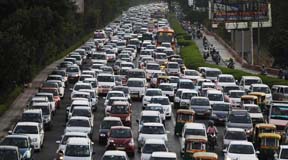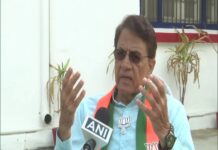

NEW DELHI: The National Green Tribunal today directed the Delhi government to submit data or studies on the basis of which it has planned to introduce the odd-even car rationing scheme for five days from next week.
The green panel questioned the rationale of the AAP government in rolling out the scheme when reports by Central Pollution Control Board (CPCB) and Delhi Pollution Control Committee (DPCC) had found that the levels of PM10 and PM2.5 were cumulatively higher when the scheme was implemented twice earlier.
On April 21 last year, the CPCB had told NGT that there was no data to suggest that the odd-even scheme has led to a decline in vehicular pollution in Delhi-NCR. Under the scheme, vehicles with odd and even numbers are allowed to ply on alternate days.
Directing the city government not to implement the scheme unless it established that it was not counter-productive, the NGT asked it to give an undertaking that it will roll out odd-even only when particulate matter (PM) 2.5 was over 300.
The prevailing level of PM2.5 in the capital was hovering around 433 microgrammes per cubic meter, while PM10 stood at around 617, as per latest CPCB data.
A bench headed by NGT Chairperson Justice Swatanter Kumar also directed the city government to submit the comparative ratio of the emission caused by diesel and petrol vehicles and asked it to clearly enumerate the contribution of small petrol cars in pollution.
It also questioned the justification of exempting two-wheelers and women drivers during the odd-even scheme despite knowing that two-wheelers caused 46 per cent pollution, as per an IIT Kanpur report.
Following a plea by the AAP government, the green panel however allowed the industries engaged in essential services to operate in the Delhi-NCR on the condition that they would not pollute and cause emissions.
the NGT also noted that the Delhi government has been taking steps in the interest of environment and public health and these were laudable.
During the hearing, the Delhi government counsel told the bench that they were introducing the odd-even scheme in pursuance to the directions of the apex court-appointed EPCA.
But the tribunal rapped the city government over this submission and said the Environment Pollution Control Authority (EPCA) had issued several suggestions and the odd-even scheme was just one of them.
“The Supreme Court had never said that you implement the odd-even scheme. It was only one of the directions given by EPCA. You have not followed 99 directions and introduced the odd-even scheme and treating it as a picnic,” the bench said.
The AAP government had yesterday announced introduction of the odd-even scheme as part of a Graded Response Plan to tackle the alarming pollution levels in the capital.
The city has been experiencing ‘severe’ air quality and has been reeling under a blanket of thick haze, as pollution levels breached permissible standards by multiple times.
With deadly smog blanketing Delhi and the neighboring states, the NGT had yesterday banned construction and industrial activities and entry of trucks. The CPCB has recorded ‘severe’ air quality, meaning that the intensity of pollution was extreme.-PTI






